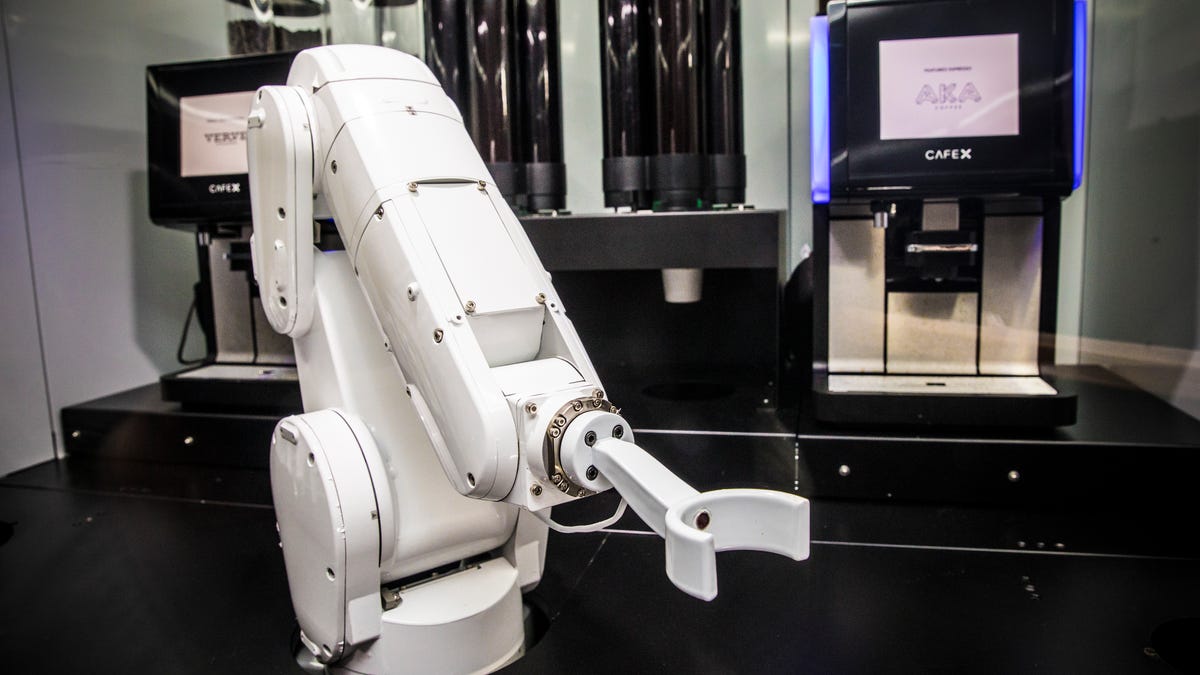Meet Gordon, your gleaming white robot barista
Startup Cafe X opens its first machine-operated cafe in San Francisco. Human baristas may shudder, but tech has been replacing humans for decades.
Robots welding cars in factories are a familiar sight. And now robots in the mall making coffee might become equally ordinary.
Startup Cafe X opens its first robotic cafe Monday in San Francisco's Metreon shopping center, a highly visible example of the increasing technological automation in our lives.
A squat white robot arm, nicknamed Gordon after a company engineer, operates a pair of standard professional coffee machines to serve you premium-grade $2.25 espressos and $2.95 caffe lattes.
The chief benefit of Cafe X's approach? The robot and its accompanying ordering and scheduling software deliver customers a faster caffeine fix, said Chief Executive Henry Hu. "I'm a coffee drinker. I've spent a lot of time waiting in line at cafes," he said.
Gordon the robot barista is a novelty today, but smart machinery just like it will become downright ordinary as robots and artificial intelligence elbow in on human jobs. And it'll be white-collar work, too, not just your cousin's summer job grinding beans, foaming milk and misspelling names on paper cups.
"In our forecast of employment in 2025, we predict 7 percent of jobs in the economy will be removed by automation," said Forrester analyst J.P. Gownder. That includes physical robots doing jobs like manufacturing and "cognitive robots" that do brainier jobs inside a computer. That level of disruption is big -- about the same as the 2008 financial crisis, he said.
Cafe X isn't out to make humans obsolete. Indeed, its cafes employ people to help customers place orders and figure out which local roaster they want supplying beans -- in San Francisco, a choice of AKA Coffee from Oakland, Verve Coffee Roasters from Santa Cruz and Peet's Coffee from Berkeley. And people will be employed to clean the equipment daily and resupply milk and other ingredients.
"It requires fewer people to operate, but it doesn't mean we will have fewer people," Hu said. Still, his robots help with downsides of humans that cafe owners have told him about. "They have a difficult time hiring, training and maintaining their barista staff. It's actually a problem," he said.
Volkswagen factory robots
Hu's inspiration for Cafe X came from a 2014 trip to Volkswagen's massive factory in Wolfsburg, Germany, where he saw the plant's hundreds of robots making cars. "Wouldn't it be cool if you could use one of these to make coffee?" he thought.
Making coffee benefits from some of the advantages automakers get using robots to install windshields -- high precision and no mistakes. "By being automated, we guarantee every cup of coffee you are served from a Cafe X machine is how the roaster intended you to enjoy their coffee," he said. Cafe X works with the roasters to fine-tune each recipe, then the robot takes it from there.
Cafe X has tested its technology in private in a Hong Kong office building and at an unnamed Silicon Valley tech giant, but Gordon is the company's first robotic barista that the public can visit. If they're lucky and business is in a lull, they might see Gordon wave.
The company lets you place an order at the cafe or order coffee ahead of time with a Cafe X phone app, scheduling a pickup time if you want. Cafe X's software intelligently juggles these orders with walk-in orders to keep waiting to a minimum, with a single robot able to make 100 to 120 cups an hour.
The first publicly available Cafe X robot barista is in the Metreon shopping center in San Francisco.
Order overload
Logistics can be difficult, though, as cafe colossus Starbucks found out. Its most recent quarterly earnings suffered because it couldn't keep up with the sudden crush of demand made possible when mobs of people order at the same time with phones .
You order Cafe X coffee with an app or a tablet at the cafe.
Faced with that sort of problem, Cafe X can simply add more robots. The prospect of robots replacing humans might alarm you, but the reality is that automation has been doing that for centuries.
Royal Caribbean has robot bartenders, but even lower-tech products like coffee machines in the kitchen means somebody's not making you the same thing in a cafe. Robots are learning how to vacuum floors, mow lawns and cook food, even if tossing salad remains out of reach for now. Every time you go through a self-checkout line at the supermarket or check in at an airline kiosk at the airport, you're contributing to the replacement of human workers.
"A lot of the automation we see winds up being more easily accepted than we imagine," Gownder said. He takes the long view about our ability to adapt: "A hundred years ago, 90 percent of people were in agriculture."
Solving for XX: The industry seeks to overcome outdated ideas about "women in tech."
Crowd Control: A crowdsourced science fiction novel written by CNET readers.


